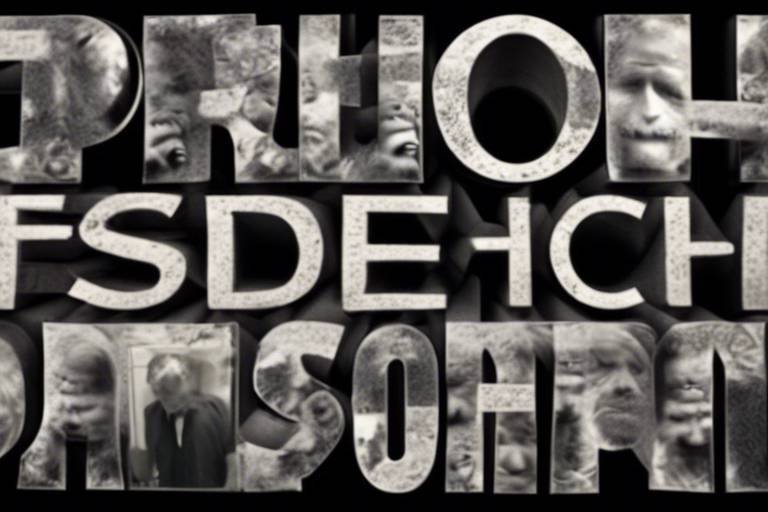Political Philosophy and the Problem of Harm
In the vast expanse of human interaction, the concept of harm emerges as a critical focal point within political philosophy. It’s not just about what we do to one another; it's about the implications of our actions, the ripple effects they create, and how societies choose to address these issues. Imagine a world where every action, every law, and every policy is scrutinized through the lens of harm—this is the essence of political philosophy. It challenges us to consider not only the rights of individuals but also the responsibilities of communities and governments in mitigating harm.
At its core, political philosophy grapples with fundamental questions: What constitutes harm? Who decides what is harmful? How do we balance individual freedoms against the collective good? These inquiries are not merely academic; they resonate deeply in our everyday lives, influencing everything from legislation to personal relationships. As we delve deeper into this intricate relationship, we uncover various theories and perspectives that shape our understanding of harm and guide our political frameworks.
Throughout history, thinkers like John Stuart Mill and Thomas Hobbes have laid the groundwork for our understanding of harm in political contexts. Mill’s principle of harm suggests that individuals should be free to act as they wish unless their actions cause harm to others. In contrast, Hobbes posits that a strong central authority is necessary to prevent the chaos that arises from human nature. These contrasting views highlight the ongoing tension in political philosophy: the need for freedom versus the need for order.
As we navigate through the complexities of harm, we must also consider the implications of our definitions. Harm can manifest in various forms—physical, psychological, social, and economic. Each type of harm carries different weight and consequences in political discussions. For instance, while physical harm may be immediately recognizable and often addressed through laws and regulations, psychological harm can be more insidious and challenging to quantify. This distinction is crucial as it shapes policies and societal norms, influencing how we respond to different forms of harm.
In the following sections, we will explore the multifaceted nature of harm in political philosophy, delving into its definitions, the legal and ethical considerations surrounding it, and the practical strategies employed to reduce harm. We will also examine the pivotal roles of consent and autonomy, and how these concepts influence our understanding of harm and the moral implications of infringing upon individual rights. Through case studies, we will illustrate the real-world complexities of harm and the policies designed to address it, providing a comprehensive overview of this essential topic in political philosophy.
- What is the importance of harm in political philosophy?
Harm is central to political philosophy as it influences laws, ethical considerations, and the balance between individual rights and societal responsibilities. - How do different types of harm affect political decisions?
Different types of harm, such as physical and psychological, require distinct responses and policies, shaping how societies navigate issues of justice and welfare. - What role do consent and autonomy play in discussions of harm?
Consent and autonomy are critical in determining the legitimacy of political agreements and interventions, highlighting the tension between individual freedoms and state authority.

The Foundations of Political Philosophy
Understanding the roots of political philosophy is essential for grasping how concepts of harm have evolved over time. Political philosophy is not just an abstract field; it's a reflection of our collective values and beliefs about society, governance, and the nature of justice. Thinkers throughout history have grappled with the question of how to balance individual rights with the greater good, and their ideas continue to influence modern political discourse.
From the ancient Greeks to contemporary philosophers, various schools of thought have emerged, each offering unique perspectives on the concept of harm. For instance, Plato believed in the idea of a just society where harm is minimized through the pursuit of the common good. In contrast, John Locke emphasized individual rights, arguing that the protection of personal freedoms is paramount, even if it means allowing some degree of harm to occur. These foundational ideas set the stage for ongoing debates about the role of the state and the responsibilities of individuals.
Moreover, the social contract theory, as articulated by philosophers like Thomas Hobbes and Jean-Jacques Rousseau, offers a framework for understanding how societies negotiate the issue of harm. Hobbes viewed human nature as inherently self-interested, suggesting that a strong, centralized authority is necessary to prevent chaos and harm. Rousseau, on the other hand, believed that individuals could achieve a harmonious society through collective agreements, emphasizing the importance of community and mutual support.
As we delve deeper into these philosophical foundations, we can categorize the major theories that have shaped our understanding of harm:
- Utilitarianism: This theory, championed by philosophers like Jeremy Bentham and John Stuart Mill, posits that actions should be evaluated based on their outcomes, specifically the overall happiness or harm they produce. The ethical challenge here lies in measuring harm and determining whose happiness counts.
- Deontological Ethics: In contrast, deontological theories, such as those proposed by Immanuel Kant, focus on the morality of actions themselves rather than their consequences. This perspective raises questions about the justifications for causing harm, even if the intentions are good.
- Virtue Ethics: Rooted in Aristotelian thought, virtue ethics emphasizes the character of the moral agent. It suggests that a virtuous society will inherently minimize harm through the cultivation of good character and moral values.
These diverse perspectives illuminate the complexities of political philosophy and the problem of harm. They challenge us to consider not only the implications of our actions but also the underlying principles that guide our decisions. As we navigate the intricate landscape of political thought, it becomes clear that the discourse on harm is not merely academic; it has real-world implications that affect policies, laws, and ultimately, the lives of individuals.
In summary, the foundations of political philosophy provide a rich tapestry of ideas that help us understand how societies grapple with the issue of harm. By exploring the thoughts of key philosophers and their theories, we can better appreciate the ongoing debates that shape our political landscape today. The interplay between individual rights and collective responsibility remains a pertinent theme, urging us to reflect on our values and the kind of society we wish to create.
- What is political philosophy? Political philosophy is the study of fundamental questions about the state, government, politics, liberty, justice, and the enforcement of a legal code by authority.
- Who are some key figures in political philosophy? Important figures include Plato, Aristotle, John Locke, Thomas Hobbes, Jean-Jacques Rousseau, and John Stuart Mill, among others.
- How does political philosophy relate to harm? Political philosophy examines how societies define, address, and mitigate harm, balancing individual rights with collective well-being.
- Why is consent important in political philosophy? Consent is crucial as it underpins the legitimacy of political agreements and the moral authority of laws and governance.

Defining Harm in Political Contexts
When we dive into the realm of political philosophy, the concept of harm takes on various dimensions that are crucial for understanding how societies function. At its core, harm can be perceived as anything that negatively impacts individuals or groups, but the nuances of this definition can lead to vastly different political implications. For instance, some might argue that harm is strictly physical, while others contend that psychological or emotional harm holds equal weight in political discourse. This divergence in definitions is not merely academic; it directly influences legislation, social policies, and the way communities engage with one another.
To further complicate matters, the context in which harm occurs can shape its definition. For example, a government may view the act of censorship as a necessary means to prevent societal harm, while critics argue that such actions inflict significant psychological harm by stifling free expression. This tug-of-war between different interpretations of harm often leads to heated debates about the role of the state in regulating behavior and protecting citizens.
In political contexts, harm can be categorized into several key types:
- Physical Harm: This includes any bodily injury or damage that can be inflicted upon an individual or group. It is often the most visible form of harm and is typically addressed through laws and regulations.
- Psychological Harm: Less tangible than physical harm, psychological harm encompasses emotional distress, trauma, and mental health issues that arise from various actions, including discrimination and harassment.
- Social Harm: This refers to the broader impact on communities and social structures, such as poverty, inequality, and systemic injustice, which can harm the fabric of society itself.
These distinctions are not just academic exercises; they have real-world implications. For instance, when discussing public health policies, policymakers must consider how their decisions may lead to both physical and psychological harm. An example of this can be seen in the debate over mandatory vaccinations. While the intention is to protect public health (and thus prevent physical harm), the psychological harm felt by individuals who oppose such measures can lead to significant societal tension.
Moreover, the definitions of harm can shift over time, influenced by cultural, social, and political changes. What was once deemed acceptable might be viewed as harmful in today's context, highlighting the need for ongoing dialogue and reassessment. This fluidity necessitates a robust framework for understanding harm that accommodates various perspectives and experiences.
In essence, defining harm in political contexts is a complex endeavor that requires careful consideration of multiple factors. By recognizing the different forms of harm and their implications, societies can better navigate the challenges of governance and create policies that genuinely protect individuals while promoting the greater good. This ongoing conversation is vital, as it shapes not only laws and regulations but also the very fabric of our communities.
- What is the significance of defining harm in political philosophy? Defining harm is crucial as it influences laws, policies, and societal norms, determining how communities interact and how individuals are protected.
- How do different interpretations of harm affect legislation? Different interpretations can lead to conflicting policies; for example, what one group sees as necessary regulation to prevent harm, another may view as an infringement on rights.
- Can harm be both physical and psychological? Yes, harm can manifest in multiple forms, including physical injuries and psychological distress, both of which are important to consider in political discussions.

Physical vs. Psychological Harm
When we talk about harm, it’s important to recognize that it comes in various forms, and two of the most significant types are physical harm and psychological harm. These categories, while distinct, often intertwine and can have profound impacts on individuals and communities alike. Imagine a person who has been in a car accident; they may have visible injuries like broken bones or cuts—this is physical harm. But what about the emotional and mental toll that the accident takes? The anxiety, depression, or post-traumatic stress that might follow? This is psychological harm, and it can be just as debilitating as physical injuries.
Physical harm is typically easier to quantify. It can be assessed through medical examinations, hospital visits, and treatment plans. For instance, a broken leg requires immediate medical attention, rehabilitation, and time off work. The costs associated with this type of harm can be calculated, and the consequences are often visible. On the other hand, psychological harm is more elusive. It doesn’t always come with a clear diagnosis or a straightforward treatment plan. The effects can manifest in various ways, such as anxiety disorders, depression, or even chronic stress, which may not be immediately apparent to others.
In political philosophy, addressing both types of harm is crucial. Policies aimed at reducing physical harm—like traffic safety laws or workplace safety regulations—are essential for protecting citizens. However, we must also consider the implications of psychological harm. For example, a workplace that fosters a toxic environment can lead to mental health issues among employees, which in turn affects productivity and overall well-being. This raises the question: how do societies balance the need for physical safety with the equally important need for mental health support?
To illustrate the differences and interconnections between these two types of harm, consider the following table:
| Type of Harm | Definition | Examples | Political Implications |
|---|---|---|---|
| Physical Harm | Injuries or damage to the body | Broken bones, cuts, illnesses | Health care policies, safety regulations |
| Psychological Harm | Emotional or mental distress | Anxiety, depression, PTSD | Mental health services, workplace policies |
Ultimately, the challenge lies in creating political frameworks that address both physical and psychological harm effectively. It’s not enough to legislate against physical injuries; we must also foster environments that promote mental well-being. This dual approach can lead to healthier, more resilient communities, where individuals feel safe not just in body, but also in mind.
- What is the difference between physical and psychological harm? Physical harm refers to injuries or damage to the body, while psychological harm involves emotional or mental distress.
- Why is it important to address both types of harm? Addressing both types of harm ensures a holistic approach to well-being, promoting healthier communities overall.
- How can policies be created to mitigate both physical and psychological harm? Policies should incorporate safety regulations while also providing mental health support and resources for individuals.

Legal Implications of Harm
The legal implications of harm are a fundamental aspect of political philosophy, shaping how societies enforce laws and uphold justice. At the heart of this discussion lies the question: What constitutes harm, and who is responsible for it? In legal contexts, harm can be categorized into various forms, including physical injury, emotional distress, and even economic loss. Understanding these categories is crucial as they inform how laws are created and enforced, impacting the lives of individuals and communities.
In many legal systems, the concept of harm is intertwined with the principle of liability. This principle holds individuals or entities accountable for actions that cause harm to others. For instance, in tort law, if a person's actions result in injury to another, the injured party may seek compensation through a lawsuit. This legal framework aims to provide justice and deter harmful behavior, reflecting societal norms about responsibility and accountability.
Moreover, the legal implications of harm extend beyond individual cases to influence broader societal policies. For example, legislation aimed at protecting public health often emerges from a recognition of potential harm. Consider the laws regulating environmental pollution; these laws are designed to mitigate harm to individuals and communities by holding corporations accountable for their actions that may lead to health hazards. The legal system thus acts as a mediator, balancing individual rights against the collective good.
Additionally, the criminal justice system plays a significant role in addressing harm. Laws that define criminal behavior are often rooted in the concept of harm, aiming to protect individuals from violence, theft, and other forms of injury. However, the interpretation of what constitutes harm can vary significantly across different cultures and legal systems, leading to ongoing debates about justice and fairness.
To illustrate this complexity, let’s consider a table that outlines different types of harm and their legal implications:
| Type of Harm | Legal Framework | Potential Consequences |
|---|---|---|
| Physical Harm | Tort Law | Compensation for medical expenses, pain, and suffering |
| Psychological Harm | Negligence Law | Damages for emotional distress |
| Economic Harm | Contract Law | Compensation for lost earnings or business |
Furthermore, ethical considerations often intersect with legal frameworks when addressing harm. Laws are not merely a reflection of societal norms; they also embody ethical principles that guide decision-making. For instance, laws regarding self-defense are rooted in the ethical principle of protecting oneself from harm, yet they raise complex questions about the extent to which force can be justified.
In conclusion, the legal implications of harm are multifaceted and deeply embedded in the fabric of political philosophy. They influence not only individual lives but also the collective values of society. As we navigate the complexities of harm within legal contexts, it is essential to consider how laws can adapt to changing societal norms and ethical standards, ensuring that justice is served while minimizing harm.
- What is the definition of harm in legal terms? Harm in legal terms refers to any physical, emotional, or economic injury that one individual may inflict upon another, which can be addressed through legal action.
- How does the law determine liability for harm? The law determines liability based on whether an individual's actions were negligent or intentional, leading to harm that can be compensated.
- Are there different types of harm recognized by the law? Yes, the law recognizes various types of harm, including physical, psychological, and economic harm, each with specific legal implications.

Ethical Considerations in Harm
When we dive into the realm of political philosophy, one of the most compelling discussions revolves around the ethical considerations of harm. What does it mean to cause harm, and under what circumstances can harm be justified? These questions are not just academic; they resonate deeply within our day-to-day lives and influence the very fabric of our societies. To navigate this complex landscape, we must consider various ethical theories that provide frameworks for understanding harm and its implications.
One prominent ethical theory is utilitarianism, which posits that the right action is the one that produces the greatest good for the greatest number. In this view, harm might be justified if it leads to a net positive outcome. For instance, consider a public health initiative that mandates vaccinations. While some individuals may experience side effects, the overall benefit of herd immunity and the prevention of disease spread can outweigh these harms. However, this raises a critical question: How do we measure 'good' and 'harm' in a way that is fair and equitable?
On the flip side, we have deontological ethics, which emphasizes duty and adherence to rules over the consequences of actions. In this framework, causing harm is inherently wrong, regardless of the potential benefits. For example, a politician might face a moral dilemma when considering policies that may infringe on individual rights for the sake of societal safety. This perspective insists on the importance of respecting individual autonomy and the principle that some harms should never be inflicted, even for a perceived greater good.
Moreover, the conversation about harm often intersects with virtue ethics, which focuses on the character of the moral agent rather than the rules or consequences. This approach encourages individuals and policymakers to cultivate virtues such as compassion, empathy, and justice. In practical terms, this might mean prioritizing restorative justice approaches in criminal justice reform, where the focus is on healing rather than punishment. Here, the ethical consideration is not just about avoiding harm but actively working towards the well-being of all parties involved.
To further illustrate these ethical considerations, let’s look at a comparative table of these ethical frameworks:
| Ethical Theory | Key Focus | Consideration of Harm |
|---|---|---|
| Utilitarianism | Greatest good for the greatest number | Harm justified if it leads to overall benefit |
| Deontological Ethics | Adherence to rules and duties | Harm is inherently wrong, regardless of outcomes |
| Virtue Ethics | Character and moral virtues | Focus on promoting well-being and healing |
In conclusion, the ethical considerations surrounding harm in political philosophy are not merely theoretical; they have real-world implications that affect how policies are formulated and implemented. By examining these frameworks, we can better understand the moral landscapes that guide our decisions and the importance of balancing the rights and welfare of individuals against the collective good. As we navigate these complex waters, we must ask ourselves: How can we ensure that our political actions reflect our ethical beliefs about harm?
- What is the role of ethics in political philosophy? Ethics provides the foundation for evaluating the moral implications of political actions and policies, particularly regarding harm.
- How do different ethical theories approach the concept of harm? Utilitarianism focuses on outcomes, deontological ethics emphasizes rules, and virtue ethics prioritizes character and well-being.
- Can harm ever be justified in politics? It depends on the ethical framework being applied; some may justify harm for greater societal benefits, while others may argue against it regardless of outcomes.

Harm Reduction Strategies
When we talk about , we're diving into a practical approach that seeks to minimize the negative consequences of certain behaviors rather than focusing solely on eliminating those behaviors altogether. This perspective is particularly relevant in political contexts where issues like drug use, sexual health, and public safety come into play. Imagine trying to extinguish a fire; sometimes, it’s more effective to contain it rather than douse it completely. This analogy holds true for harm reduction, as it aims to manage risks while acknowledging that certain behaviors may persist regardless of the laws or regulations in place.
One of the most notable examples of harm reduction strategies is found in the realm of public health. Governments and health organizations have recognized that simply criminalizing drug use does not stop people from using drugs; instead, it often exacerbates the problem. Instead, harm reduction approaches like needle exchange programs and safe consumption sites have emerged. These initiatives provide users with clean needles and a safe environment to consume substances, significantly reducing the spread of diseases like HIV and Hepatitis C. Additionally, these programs often serve as entry points for individuals seeking treatment and support, highlighting the dual benefit of addressing immediate harm while promoting long-term health.
Moreover, harm reduction strategies are not limited to substance use. They extend into areas like sexual health, where initiatives such as condom distribution and comprehensive sex education aim to reduce the risks associated with unprotected sex. By equipping individuals with the necessary tools and knowledge, these strategies empower them to make safer choices, ultimately leading to lower rates of sexually transmitted infections and unwanted pregnancies.
It's essential to recognize that harm reduction strategies can also have significant economic implications. By reducing the burden of disease and injury, these approaches can lead to lower healthcare costs and increased productivity. For instance, a study conducted in a city with a robust needle exchange program found that for every dollar spent on harm reduction, there was a return of up to $4 in savings on healthcare costs. This creates a compelling argument for policymakers to invest in harm reduction initiatives as a means of fostering healthier communities while also being financially prudent.
However, implementing harm reduction strategies is not without its challenges. There are often political and social stigmas associated with these approaches, particularly when it comes to drug use. Critics may argue that they enable risky behaviors or send the wrong message. Yet, proponents emphasize that the goal is not to condone harmful actions but rather to acknowledge their existence and mitigate their consequences. It's a delicate balance that requires open dialogue and a commitment to evidence-based practices.
In summary, harm reduction strategies represent a pragmatic and empathetic approach to addressing complex social issues. By focusing on minimizing harm rather than enforcing abstinence, these strategies pave the way for healthier communities and more effective public policies. As we continue to grapple with the challenges of modern society, embracing harm reduction could be key to fostering resilience and well-being among individuals and communities alike.
- What is harm reduction? Harm reduction refers to policies and programs that aim to reduce the negative consequences associated with certain behaviors, particularly those related to drug use and sexual health.
- How do harm reduction strategies work? These strategies work by providing individuals with the tools and resources they need to make safer choices, thereby minimizing the risks associated with their behaviors.
- Are harm reduction strategies effective? Yes, studies have shown that harm reduction strategies can lead to significant improvements in public health outcomes, such as reduced rates of disease transmission and improved access to treatment.
- What are some examples of harm reduction strategies? Examples include needle exchange programs, safe consumption sites, condom distribution, and comprehensive sex education.

The Role of Consent and Autonomy
The concepts of consent and autonomy play a pivotal role in political philosophy, shaping how we understand individual rights and the responsibilities of the state. At its core, consent is about the agreement between individuals and governing bodies, a fundamental element that legitimizes political authority. Without consent, the actions of the state can be viewed as coercive rather than cooperative, leading to a breakdown in trust and legitimacy. This raises an important question: how can we ensure that consent is both informed and voluntary? When individuals are not fully aware of their choices or are under pressure, the integrity of their consent is compromised, leading to ethical dilemmas.
Similarly, autonomy refers to the capacity of individuals to make their own choices and govern themselves. In political discussions, autonomy is often juxtaposed with the need for state intervention, especially when it comes to preventing harm. This tension can be likened to a delicate dance: on one hand, the state has a responsibility to protect its citizens from harm, but on the other, it must respect the autonomy of individuals to make decisions about their own lives. This balancing act is not only challenging but also critical in formulating policies that respect personal freedoms while aiming to mitigate risks.
To illustrate this point, consider a scenario involving public health policies. When implementing measures to combat a health crisis, such as a pandemic, governments must navigate the tricky waters between enforcing regulations and respecting individual autonomy. For instance, mandatory vaccinations raise questions about consent: are individuals truly consenting if they feel coerced by societal pressure or legal mandates? This situation highlights the need for transparent communication and education to empower individuals to make informed decisions about their health, thus ensuring that consent is genuine.
Moreover, the implications of violating consent can be severe. When individuals feel that their autonomy has been undermined, it can lead to widespread discontent and resistance. This is particularly evident in cases where marginalized communities feel that their voices are not heard in political processes, leading to a sense of disenfranchisement. Consequently, fostering an inclusive environment where consent is actively sought and respected can strengthen societal bonds and enhance the legitimacy of political institutions.
In summary, the interplay between consent and autonomy is crucial in political philosophy. It challenges us to rethink how we approach governance and the ethical implications of our decisions. As we continue to grapple with these concepts, it becomes increasingly important to create frameworks that prioritize informed consent and respect individual autonomy. This not only enriches our political discourse but also lays the groundwork for a more just and equitable society.
- What is the difference between consent and autonomy?
Consent refers to the agreement given by individuals to participate in actions or decisions, while autonomy is the ability of individuals to make their own choices independently.
- Why is consent important in political philosophy?
Consent is essential as it legitimizes the authority of the state and ensures that individuals are active participants in the governance process.
- How does autonomy affect public policy?
Autonomy affects public policy by necessitating a balance between individual freedoms and the state's responsibility to protect citizens from harm.

Consent in Political Agreements
Consent is a cornerstone of any political agreement, acting as the glue that binds individuals to the social contracts that govern their lives. Imagine a world where decisions are made without the approval of those affected; it would be chaotic, akin to a ship sailing without a captain. In political philosophy, consent is not just a formality; it’s a vital expression of autonomy and legitimacy. When individuals consent to an agreement, they are essentially giving their stamp of approval, acknowledging that they accept the terms and conditions laid out before them.
However, the process of obtaining consent is far from straightforward. It raises a myriad of questions: How informed is the consent being given? Is it voluntary, or is there coercion involved? These questions are crucial because they determine the ethical standing of the political agreement. For instance, if a government imposes a law without the consent of its citizens, one could argue that the law lacks legitimacy, regardless of its intent or potential benefits. This brings us to the concept of informed consent, which requires that individuals fully understand the implications of their agreement before they give it.
Furthermore, the implications of consent extend beyond mere agreements; they touch on the broader societal values of freedom and justice. In democratic societies, the idea of consent is celebrated, often embodied in the principle of majority rule. Yet, this raises another dilemma: what happens to the rights of the minority? If the majority consents to a policy that infringes on the rights of a minority, is that still considered just? This is where the tension between individual rights and collective decision-making becomes apparent.
To illustrate the complexities of consent in political agreements, let’s consider a few key aspects:
- Types of Consent: Consent can be explicit, where individuals clearly agree to terms, or implicit, where agreement is inferred from actions.
- Revocation of Consent: Individuals have the right to withdraw their consent at any time, which can complicate ongoing political agreements.
- Collective vs. Individual Consent: The challenge of ensuring that collective decisions respect individual autonomy is a persistent issue in political philosophy.
In conclusion, consent in political agreements is not merely a procedural step; it is a profound reflection of our values as a society. It speaks to the heart of what it means to live in a community where individuals have a say in the decisions that affect their lives. As we navigate the complexities of political interactions, it is essential to ensure that consent is not just obtained, but understood, respected, and upheld.
- What is the importance of consent in political agreements? Consent legitimizes agreements and ensures that individuals have a voice in the decision-making process.
- Can consent be revoked? Yes, individuals have the right to withdraw their consent, which can impact ongoing agreements.
- How does consent relate to individual rights? Consent is crucial in protecting individual rights, especially when collective decisions may infringe upon them.

Autonomy and State Intervention
When we talk about autonomy, we're diving into the essence of what it means to be an individual in a society. Autonomy is all about the ability to make choices and govern oneself. It's the idea that each person should have the freedom to decide their path, pursue their dreams, and live life on their terms. However, this beautiful concept of autonomy often faces a challenging adversary: state intervention. The state, representing collective interests, sometimes steps in to regulate behavior, aiming to protect individuals or the community as a whole. But where do we draw the line between protecting citizens and infringing on their personal freedoms?
This tension between autonomy and state intervention is a hot topic in political philosophy. Imagine a seesaw: on one side, you have the weight of individual freedom, and on the other, the weight of societal safety and welfare. The balance is delicate, and tipping too far in either direction can lead to significant consequences. For instance, if the state enforces strict regulations on personal choices—like what one can consume or how one can express themselves—it risks undermining individual autonomy. On the flip side, if the state allows complete freedom without any oversight, it could lead to harm against vulnerable populations. This tug-of-war raises critical questions: How much control should the state have? And at what point does intervention become oppressive?
To better understand this complex relationship, we can look at various political philosophies and their approaches to autonomy and intervention. For example:
| Political Philosophy | View on Autonomy | View on State Intervention |
|---|---|---|
| Libertarianism | Strong emphasis on individual autonomy | Minimal state intervention; only to protect rights |
| Utilitarianism | Values autonomy but prioritizes overall happiness | Intervention justified if it leads to greater good |
| Communitarianism | Emphasizes community values over individual autonomy | Supports intervention to promote community welfare |
As we can see from the table above, different political philosophies offer varying perspectives on how autonomy should be valued and how much intervention is justified. For example, libertarians argue for minimal interference, believing that individuals should have the freedom to make their own choices, even if those choices lead to potential harm. On the other hand, utilitarians might advocate for intervention if it results in the greatest happiness for the majority, even if it means curtailing individual freedoms in certain situations.
One of the most pressing questions in this debate is: How do we ensure that state intervention is justified and not merely an overreach of power? This question is particularly relevant in areas such as public health, where the state may need to impose restrictions for the greater good. For instance, during a pandemic, governments may enforce lockdowns or vaccination mandates to protect public health. While these measures can save lives, they also raise concerns about personal freedom and the right to make individual choices.
Ultimately, the balance between autonomy and state intervention is not just a theoretical debate; it has real-world implications that affect our daily lives. As citizens, we must remain vigilant and engaged in discussions about the role of the state in our personal choices. It’s essential to advocate for policies that respect individual autonomy while recognizing the need for intervention in cases where harm could occur. After all, the goal is to create a society where individuals can thrive without compromising the safety and well-being of the community.
- What is autonomy in political philosophy? Autonomy refers to the ability of individuals to make their own choices and govern themselves without external control.
- Why is state intervention necessary? State intervention is often necessary to protect public safety, welfare, and rights, especially in situations where individual choices may harm others.
- How do different political philosophies view autonomy? Different philosophies prioritize autonomy differently, with libertarians emphasizing minimal intervention and communitarians focusing on community welfare.
- Can state intervention infringe on personal freedoms? Yes, state intervention can sometimes infringe on personal freedoms, leading to debates about the appropriate level of control the government should have.

Case Studies in Harm and Policy
When we talk about harm in the realm of political philosophy, it's not just an abstract concept; it has real-world implications that can shape entire societies. To illustrate this, let's dive into some compelling case studies that shine a light on how different policies have been crafted to address harm, revealing the intricate dance between theory and practice.
One notable example is the implementation of public health policies aimed at reducing harm associated with substance abuse. In many countries, governments have adopted harm reduction strategies that prioritize the health and safety of individuals over punitive measures. For instance, the introduction of needle exchange programs has been a game-changer in cities grappling with high rates of HIV and hepatitis C transmission among intravenous drug users. By providing clean needles, these programs not only reduce the spread of infectious diseases but also encourage users to seek treatment and rehabilitation, illustrating a profound shift from punishment to public health.
Another critical case study is found in the realm of criminal justice reform. The criminal justice system has historically been a battleground for discussions of harm, particularly regarding how society addresses crime and its consequences. In recent years, many jurisdictions have recognized that harsh sentencing laws disproportionately affect marginalized communities and do little to deter crime. Reforms aimed at reducing mandatory minimum sentences for non-violent offenses have emerged as a response to the call for a more equitable approach to justice. These initiatives not only aim to lessen the harm inflicted on individuals who are caught in the system but also seek to address the broader societal issues that contribute to crime.
Moreover, the effectiveness of policies can often be measured through data. For instance, a study conducted in several U.S. states revealed that states implementing comprehensive drug treatment programs saw a significant decrease in overdose deaths compared to those that maintained a strictly punitive approach. The following table summarizes the findings:
| State | Policy Implemented | Change in Overdose Deaths (%) |
|---|---|---|
| State A | Comprehensive Drug Treatment | -30% |
| State B | Strict Punitive Measures | +15% |
| State C | Mixed Approaches | -5% |
This table underscores the notion that policies grounded in harm reduction not only save lives but also promote a healthier society overall. However, these case studies also highlight the ethical dilemmas that arise when implementing such policies. For example, while harm reduction strategies may be effective, they can sometimes face opposition from communities that view them as enabling drug use rather than addressing the root causes of addiction.
In conclusion, these case studies reveal the complexity of addressing harm through policy. They challenge us to rethink traditional approaches and consider the broader implications of our decisions. As we navigate these waters, it becomes increasingly clear that the intersection of political philosophy and practical policy-making requires a nuanced understanding of harm, one that prioritizes human dignity and well-being above all else.
- What is harm reduction?
Harm reduction refers to strategies and policies designed to minimize the negative health, social, and legal impacts associated with certain behaviors, particularly drug use.
- How do public health policies address harm?
Public health policies aim to reduce harm by implementing programs that promote health and safety, such as vaccination campaigns, drug treatment programs, and educational initiatives.
- What are the ethical considerations in criminal justice reform?
Ethical considerations include the balance between punishment and rehabilitation, the impact on marginalized communities, and the effectiveness of different approaches to reducing crime.

Public Health Policies
Public health policies are crucial in shaping the well-being of communities and addressing the multifaceted nature of harm. These policies are designed not just to prevent disease but also to promote health and ensure that individuals have access to necessary resources for a healthy life. In a world where health disparities are prevalent, the role of public health policies becomes even more significant. They act as a bridge, connecting individual health needs with broader societal goals.
One of the primary objectives of public health policies is to reduce harm caused by various factors, including environmental hazards, infectious diseases, and lifestyle choices. For instance, consider the impact of smoking on public health. Governments worldwide have implemented a range of policies to mitigate the harm caused by tobacco use, including:
- Strict regulations on advertising
- High taxes on tobacco products
- Public smoking bans
- Comprehensive smoking cessation programs
These measures not only aim to protect non-smokers from secondhand smoke but also encourage smokers to quit, ultimately reducing the overall harm associated with tobacco use.
Another area where public health policies have made a profound impact is in the management of infectious diseases. The recent global pandemic highlighted how swiftly public health policies can be enacted to protect populations. Governments implemented measures such as:
- Mandatory vaccinations
- Quarantine protocols
- Public health campaigns on hygiene practices
These interventions were pivotal in controlling the spread of the virus, demonstrating how effective public health policies can be in mitigating harm during a health crisis.
Moreover, the ethical implications of public health policies cannot be overlooked. While the goal is to minimize harm, the balance between individual rights and collective safety often leads to contentious debates. For example, mandatory vaccinations raise questions about personal autonomy versus the need to protect public health. Policymakers must navigate these complexities carefully, ensuring that the policies they implement are not only effective but also just and equitable.
In conclusion, public health policies serve as a vital mechanism for addressing harm within societies. By focusing on prevention and health promotion, these policies can significantly reduce the burden of disease and enhance the quality of life for individuals. However, the challenge remains in crafting policies that respect individual rights while promoting the greater good. As we move forward, it is essential to engage in ongoing discussions about the ethical dimensions of public health policies and their implications for harm reduction.
Q: What are public health policies?
A: Public health policies are guidelines and regulations established by governments or organizations to protect and improve the health of populations. They encompass a wide range of initiatives aimed at preventing disease and promoting health.
Q: How do public health policies reduce harm?
A: These policies reduce harm by implementing preventive measures, such as vaccinations, health education, and regulations on harmful substances, thereby minimizing the risks associated with diseases and unhealthy behaviors.
Q: What role do ethics play in public health policies?
A: Ethics is crucial in public health policies as it involves balancing individual rights with the collective good. Policymakers must consider the moral implications of their decisions and strive for fairness and equity in health interventions.

Criminal Justice Reform
The realm of is a critical area where the principles of political philosophy intersect with the practicalities of harm. At its core, criminal justice reform seeks to address the myriad issues that arise from a system often criticized for perpetuating harm rather than alleviating it. This reform movement is not just about changing laws; it’s about reshaping the entire framework within which justice is administered. It’s an exploration of how society defines harm and who gets to decide what justice looks like.
Historically, the criminal justice system has been seen as a mechanism for punishment rather than rehabilitation. This punitive approach has led to a cycle of harm that disproportionately affects marginalized communities. For instance, consider the statistics: in many countries, individuals from lower socioeconomic backgrounds are more likely to be incarcerated. This raises an important question: Are we truly seeking justice, or are we merely perpetuating a system of harm?
One of the most pressing issues within criminal justice reform is the need for decriminalization of certain offenses, particularly those related to drug use. The war on drugs has been a significant contributor to mass incarceration, with individuals often facing severe penalties for non-violent offenses. Reform advocates argue that a shift towards decriminalization, coupled with harm reduction strategies, can significantly reduce the societal and individual harms associated with drug-related crimes. This approach not only alleviates the burden on the legal system but also addresses the underlying issues of addiction and mental health.
Moreover, the concept of restorative justice has gained traction as a viable alternative to traditional punitive measures. Restorative justice emphasizes repairing the harm caused by criminal behavior through inclusive processes that engage all stakeholders. This might involve mediated meetings between victims and offenders, aiming to foster understanding and healing rather than retribution. The effectiveness of such programs is compelling, with studies showing lower recidivism rates among participants compared to those who undergo conventional sentencing.
To illustrate the impact of criminal justice reform, let’s look at some key initiatives that have been implemented in various regions:
| Initiative | Description | Impact |
|---|---|---|
| Drug Courts | Specialized court programs that focus on rehabilitation for drug offenders. | Reduced recidivism and lower incarceration rates. |
| Sentencing Reforms | Changes to mandatory minimum sentences for non-violent offenses. | Decreased prison populations and increased focus on rehabilitation. |
| Community Policing | Police strategies that build relationships with community members. | Improved community trust and reduced crime rates. |
These initiatives highlight the potential for a more humane and effective approach to justice. However, reform is not without its challenges. Resistance often comes from those who benefit from the status quo, including private prison industries and certain political factions. Thus, the journey towards reform requires not only a commitment to change but also a robust public discourse that challenges existing narratives around crime and punishment.
In conclusion, criminal justice reform is a multifaceted issue that demands a reevaluation of how we perceive harm and justice in society. By embracing restorative practices, decriminalization, and community-oriented strategies, we can pave the way for a more equitable system that prioritizes healing and justice over punishment. It’s a daunting task, but the potential for positive change is immense, and it’s a conversation that we must continue to have.
- What is criminal justice reform? Criminal justice reform refers to efforts aimed at improving the fairness and effectiveness of the criminal justice system.
- Why is reform needed? Many argue that the current system disproportionately harms marginalized communities and fails to rehabilitate offenders.
- What are some common reform strategies? Strategies include decriminalization of certain offenses, restorative justice practices, and changes to sentencing laws.
- How can individuals get involved in reform efforts? Individuals can participate by advocating for policy changes, supporting reform organizations, and educating themselves and others about the issues at hand.
Frequently Asked Questions
- What is the relationship between political philosophy and harm?
The relationship between political philosophy and harm is intricate, as political philosophy seeks to understand how societies can navigate and mitigate harm among individuals and communities. Different theories and thinkers contribute to this discourse, shaping how we view and address harm in our political systems.
- How is harm defined in political contexts?
Harm can be defined in various ways within political contexts, often focusing on physical, psychological, and social dimensions. These definitions influence political decisions and societal norms, affecting how policies are formulated to protect individuals and communities from harm.
- What are the legal implications of harm?
The legal implications of harm are significant, as laws are designed to reflect societal views on what constitutes harm and how it should be addressed. Legal frameworks outline responsibilities for individuals and the state, aiming to create a just society where harm is minimized.
- What ethical considerations are involved in discussions of harm?
Ethical considerations play a central role in discussions of harm within political philosophy. Various ethical theories provide different perspectives on what constitutes justifiable harm in political decision-making, influencing how policies are created and implemented.
- What are harm reduction strategies?
Harm reduction strategies are practical approaches aimed at minimizing harm, particularly in contexts like public health and social policies. These strategies focus on reducing negative consequences rather than eliminating the behaviors that lead to harm, making them a pragmatic choice in political discourse.
- How do consent and autonomy relate to harm?
Consent and autonomy are pivotal concepts in discussions of harm, as they address the moral implications of infringing on individual rights. Political philosophy examines how these concepts influence societal norms and the extent to which individuals should be protected from harm by the state.
- Can you provide examples of case studies related to harm and policy?
Yes! Case studies in harm and policy illustrate the complexities involved in addressing harm through political means. Examples include public health policies aimed at reducing community harm and criminal justice reform initiatives that seek to address systemic issues related to harm caused by crime.



















